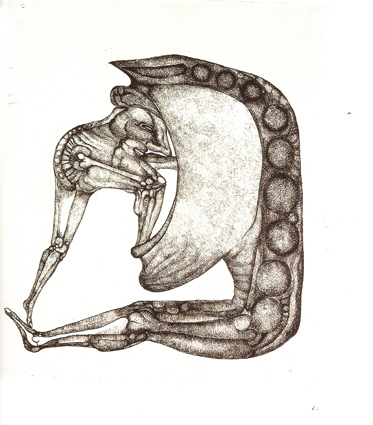Fred Deux
Recovered memory
There exist few works that we come out of scathed—works of love that embrace suffering as if it is the only substrate that is worth shaping; Yes, there are works like those of Fred Deux, which do not speak of the intellect but rather of the “folle du logis” that Malebranche distrusted—the imaginative clay that rumbles under the weight of the past and requires our trembling wills to advance though the rubble of our darkness as if that alone will show us the path to dawn.
Recovered memory
For over 60 years, tirelessly, the painter-philosopher Fred Deux continues to question himself. He searches the mysteries of his memory, building within the darkness chapels, crypts, and tombs made of vines where images of his childhood are agglomerated in a sacred mess. “The idea kills art, assassinates originality” (Fred Deux, Continuum): the only true art is cathartic. Any work that is not the visceral expression of this need is not worthy of our attention. “If your eye causes you to sin, pluck it out,” says the Gospel.
More than an artist, Fred Deux is a “master”—in the antiquated sense where the term marked the spiritual value of a man. The steps of the celestial ladder thrust themselves deep into the moist earth of a cave and to want to climb them without falling back is to miss the true meaning of the ascent. The face of God emerges only in silence, in the steep solitude of our wounds, where the blood that pumps in our temples guides our hand towards the lesion and turns the pencil tip into the scalpel. Draw possession. Write exorcism. Prove yourself worthy of the task that was assigned to you: to die in the world, and be reborn each day, patiently, even if just on the white surface of paper.
There is no difference between the act of writing and that of drawing. Or rather, these two practices generate one and the same freedom—the freedom to become one’s own speaker. Fred Deux is not an artist in the usual sense of the word, for the task he has set for himself is the simplest and most daunting of all: the task of the backward march, the march without honor or hope, but one that in turn, while other men sleep, brings the one who has sacrificed his life a new hope and rebirth.

Any work that is not built on sand constructs itself on the margins of its creator—it is a means not an end. That is why the drawings of Fred Deux deserve neither admiration nor reproach; they are, simply, that which was required to accomplish their work: the transfiguration of suffering into shapes. “The word is flesh and bread. It shares the fate of bread and flesh: suffering.” (Mandelstam, Poetry). Only suffering allows the gesture of the hand to be accurate and confident. Art has been given to man to teach him to overcome his suffering, to extricate himself from violence and his rites in order to turn them into yet another instrument in the service of love and its contagion.
There is no gift that is not the result of a decision.
Frédéric-Charles Baitinger
Fred Deux
fr.wikipedia.org/wiki/Fred_DeuxHalle Saint-Pierre
Fred Deux - Cécile Reims
du 15 Septembre 2008 au 8 Mars 2009
2, rue Ronsard - 75018 Paris - Métro : Anvers, Abbesses
www.hallesaintpierre.org
